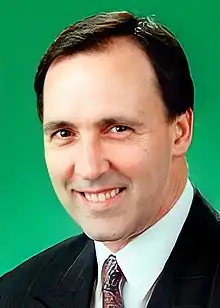| Blaxland Australian House of Representatives Division | |
|---|---|
 Division of Blaxland in New South Wales, as of the 2016 federal election | |
| Created | 1949 |
| MP | Jason Clare |
| Party | Labor |
| Namesake | Gregory Blaxland |
| Electors | 107,348 (2022) |
| Area | 61 km2 (23.6 sq mi) |
| Demographic | Inner metropolitan |
The Division of Blaxland is an Australian electoral division in the state of New South Wales.
Blaxland runs from the M4 motorway line in the north to Marion Street and the Bankstown railway line and M5 motorway in the south, between Woodville Road in the west and Stacey Street in the east, covering 61 square kilometres of Labor heartland in the Cumberland and Canterbury-Bankstown local government areas in Sydney's west,[1] with strong Middle Eastern and East Asian communities.
History

The division was created in 1949 and is named after Gregory Blaxland, a farmer and an early Australian explorer of the Blue Mountains in New South Wales.[2] The division has been a comfortably safe seat for Labor since its creation; western Sydney has been a Labor heartland for over a century. Initially created as a notional Lang Labor seat, the official ALP narrowly won it over former NSW Premier Jack Lang. This is the only election at which (official) Labor has won less than 56 percent of the two-party vote, as well as the only one in which it did not win an outright majority on the first count.
Its most notable member has been Paul Keating, who was Prime Minister of Australia from 1991 until 1996 after having previously served as Treasurer of Australia from 1983 until 1991. In 2007, Keating's successor, Michael Hatton, lost preselection for this seat to current member Jason Clare, who was a staffer for former New South Wales Premier Bob Carr.[3]
In 2017, the division had the highest percentage of "No" responses in the Australian Marriage Law Postal Survey, with 73.9% of the electorate's respondents to the survey responding "No".[4] The Survey had strong opposition from Muslim communities in the electorate.[5][6]
Boundaries
Since 1984, federal electoral division boundaries in Australia have been determined at redistributions by a redistribution committee appointed by the Australian Electoral Commission. Redistributions occur for the boundaries of divisions in a particular state, and they occur every seven years, or sooner if a state's representation entitlement changes or when divisions of a state are malapportioned.[7]
The division is based in the western suburbs of Sydney, and includes the suburbs of Bass Hill, Berala, Birrong, Chester Hill, Georges Hall, Lansdowne, Lansvale, Potts Hill, Regents Park, Sefton, and Yagoona; and parts of the business park and airport at Bankstown Airport; as well as parts of Auburn, Bankstown, Canley Vale, Carramar, Condell Park, Guildford, Lidcombe, Merrylands, South Granville, Villawood, and Yennora.
Demographics
Blaxland is a socially conservative[5] and historically working-class electorate[6] which includes sizable immigrant populations from China, Vietnam, and the Middle East. It has one of the highest Muslim populations in Australia at 29.2%.[8] According to the 2016 census, 20.1% of electors spoke Arabic at home,[8] the highest percentage in Australia. The electorate remains an electoral stronghold for the centre-left Labor Party.
Members
| Image | Member | Party | Term | Notes | |
|---|---|---|---|---|---|
 |
Jim Harrison (1903–1976) |
Labor | 10 December 1949 – 29 September 1969 |
Previously a member of the New South Wales Legislative Council. Retired | |
 |
Paul Keating (1944–) |
Labor | 25 October 1969 – 23 April 1996 |
Served as Northern Australia minister under Whitlam and Hawke. Served as Treasurer and Deputy Prime Minister under Hawke. Served as Prime Minister from 1991 to 1996. Resigned to retire from politics | |
 |
Michael Hatton (1951–) |
Labor | 15 June 1996 – 17 October 2007 |
Lost preselection and retired | |
.jpg.webp) |
Jason Clare (1972–) |
Labor | 24 November 2007 – present |
Served as minister under Gillard and Rudd. Incumbent. Currently a minister under Albanese |
Election results
| Party | Candidate | Votes | % | ±% | |
|---|---|---|---|---|---|
| Labor | Jason Clare | 44,905 | 54.98 | −2.80 | |
| Liberal | Oz Guney | 22,059 | 27.01 | −1.81 | |
| Greens | Linda Eisler | 5,187 | 6.35 | +0.99 | |
| United Australia | Elvis Sinosic | 5,105 | 6.25 | +3.37 | |
| One Nation | Adam Stepanoff | 4,421 | 5.41 | +5.41 | |
| Total formal votes | 81,677 | 89.21 | +2.51 | ||
| Informal votes | 9,884 | 10.79 | −2.51 | ||
| Turnout | 91,561 | 85.37 | −3.08 | ||
| Two-party-preferred result | |||||
| Labor | Jason Clare | 53,039 | 64.94 | +0.22 | |
| Liberal | Oz Guney | 28,638 | 35.06 | −0.22 | |
| Labor hold | Swing | +0.22 | |||
References
- ↑ "Blaxland - Federal Electorate, Candidates, Results". abc.net.au. Retrieved 6 June 2022.
- ↑ "Division of Blaxland". Electorate profiles. Australian Electoral Commission.
- ↑ Bowe, William. "Blaxland". House of Representatives 2007. The Poll Bludger. Archived from the original on 10 January 2008. Retrieved 21 September 2007.
- ↑ "Australian Marriage Law Postal Survey 2017 Response Final". Australian Bureau of Statistics. 15 November 2017.
- 1 2 "Same-sex marriage survey: religious belief matched no vote most closely". the Guardian. 17 November 2017. Retrieved 7 June 2022.
- 1 2 Bagshaw, Eryk (16 November 2017). "Same-sex marriage result: Why multicultural communities registered huge 'no' votes". The Sydney Morning Herald. Retrieved 7 June 2022.
- ↑ Muller, Damon (14 November 2017). "The process of federal redistributions: a quick guide". Parliament of Australia. Retrieved 19 April 2022.
- 1 2 "2016 Blaxland, Census All persons QuickStats | Australian Bureau of Statistics". www.abs.gov.au. Retrieved 6 June 2022.
- ↑ Blaxland, NSW, 2022 Tally Room, Australian Electoral Commission.